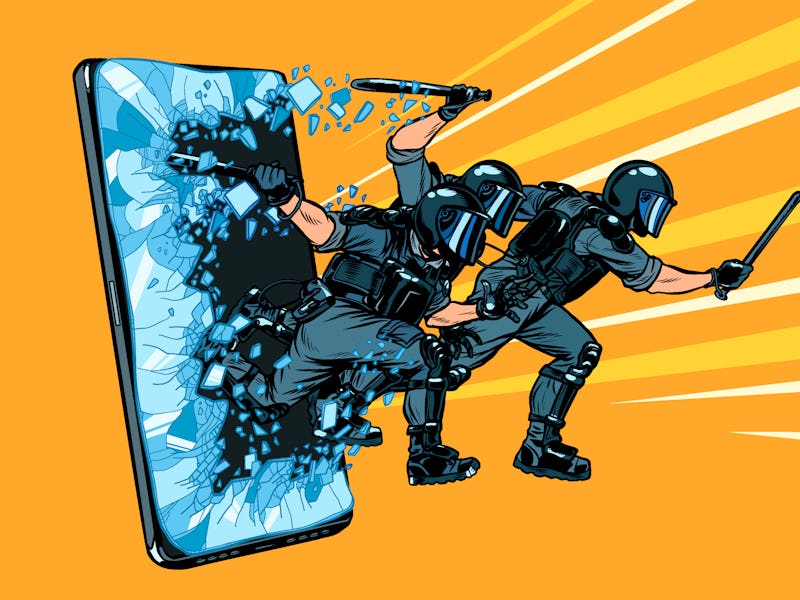Censorship and fake news could ruin the Internet, if we let it
Anything made by humans can also be altered by humans.

Take a deep breath. Imagine it is 1999. Silicon Valley is booming in a way nobody has seen before. Social media doesn’t really exist yet, so people use message boards and chat rooms. There’s a strong media ecosystem that doesn’t exist online, but it seems like more and more people are using the Internet every day. Why? Because the Internet feels like a place to connect with the world, a place that’s more free.
The Internet of the olden times was never a utopia, and the Internet still has amazing connective abilities, but something has shifted powerfully from the days of online optimism. Inverse predicts that in the 2020s, the two biggest online trends will be censorship and disinformation.
This is #2 on Inverse’s 20 predictions for the 2020s.
Censorship is generally being driven by governments around the world, like when Russia recently banned the encrypted email client ProtonMail. China’s “Great Firewall” is famous around the world for its strict censorship that keeps its own citizenry from learning about imminent health risks like coronavirus. And in the United States, laws like FOSTA-SESTA and increased surveillance have led the independent group Freedom House to lower its Internet Freedom ranking for three years straight.
On the disinformation side of things, inaction by social media giants like Facebook has turned into a full-on global crisis, with governments around the world attempting to get a handle on the problem. Misinformation posted on Facebook has led to a genocide in Mynammar, where military personal were able to post and share hate-filled fake news without a second thought. While the California-based company eventually took down the posts, it was only after the damage had been done.
“The military has gotten a lot of benefit from Facebook,” said Thet Swe Win, founder of Synergy, a group that focuses on fostering social harmony in Myanmar, told the New York Times in October 2018. “I wouldn’t say Facebook is directly involved in the ethnic cleansing, but there is a responsibility they had to take proper actions to avoid becoming an instigator of genocide.”
There has been pushback against both of these trends, of course. There are researchers who are doing their best to crack through the Great Firewall. Facebook itself has taken a partner in the news corporation Reuters to help stamp out fake news. But still, does anyone really think that a website as open and porous as Facebook will be able to contain fake news?
"You're basically negotiating with the foxes to keep the hens safe," Brooke Binkowski, the managing editor of the site Truth or Fiction, recently told Inverse. "What happens is Facebook gets to control whatever output it wants and still with no transparency at all, so we fact-checkers can break our backs for the truth and their algorithms will still merrily spread disinformation all over the world and corrode every democracy it touches."
So, neither option sounds great. And of course, censorship and misinformation are natural allies: it’s very easy to imagine a government combining the two approaches before shutting down the Internet entirely, as has happened in both Iraq and the disputed Indian region of Kashmir. Where there’s political instability, the forces of the Internet and social media are cheap, readily available weapons for governments and leaders that want to control a conversation.
There’s no easy solution to these problems. But it’s worth remembering that tech doesn’t exist in a vacuum—its problems come from people, and these problems are connected to all the other problems people make for each other.
“The powers of the nefarious troika of the big tech, big money, and big state could – and should be – contested,” writes tech critique Evgeny Morozov in The Guardian, talking about how the crisis has affected the United States. “But this has to be done directly – by explicitly invoking and contesting the links between the financial, military, and technology dimensions of US power – and not indirectly, by discussing natural tendencies towards monopolization in digital capitalism.”
It’s important to remember that these systems, as digital and inhuman as they seem, were in fact made by humans. And anything made by humans can be altered by humans in some way or another.
As 2019 draws to a close, Inverse is looking to the future. These are our 20 predictions for science and technology for the 2020s. Some are terrifying, some are fascinating, and others we can barely wait for. This has been #2. Read a related story here.